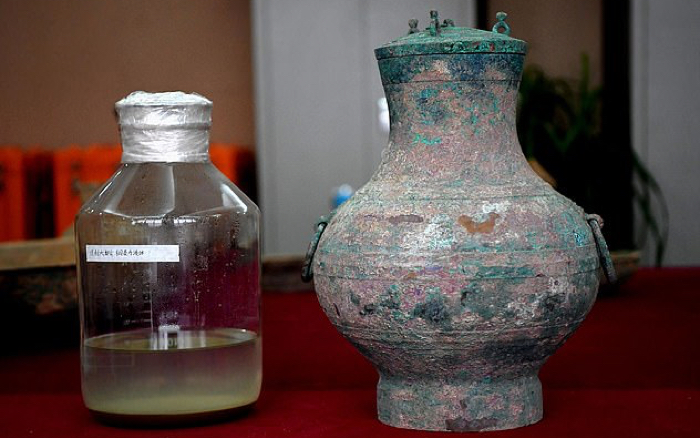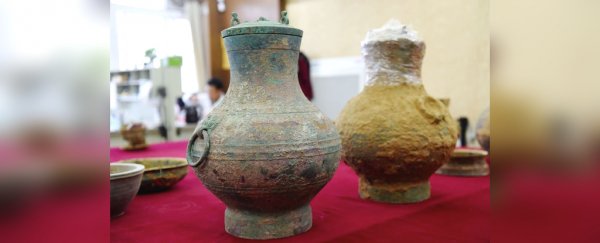Researchers in China have identified a mysterious liquid contained in an ancient bronze pot from thousands of years ago, and it turns out to be a famous potion fabled in Chinese legend.
According to the archaeologists, the strange yellowish liquid uncovered during excavations in central China's Henan Province late last year is an ancient 'elixir of immortality', once thought in centuries past to bestow immortal life upon those who drank it.
"It is the first time that mythical 'immortality medicines' have been found in China," Shi Jiazhen, the head of the Institute of Cultural Relics and Archaeology, told Xinhua this week.
"The liquid is of significant value for the study of ancient Chinese thoughts on achieving immortality and the evolution of Chinese civilisation."
 (Institute of Cultural Relics and Archaeology)
(Institute of Cultural Relics and Archaeology)
The bronze pot was unearthed from a sprawling 210 square-metre (2,260 sq ft) tomb, dating back to the Western Han Dynasty (202 BCE to 8 CE) in the city of Luoyang.
It lay among a haul comprising a number of ancient artefacts, including painted clay pots and a goose-shaped lamp – not to mention the preserved remains of the tomb's occupant.
But it was the mysterious liquid – still held in the bronze pot after some 2,000 undisturbed years – that captured the researchers' imaginations, giving off an aroma of rich wine, which led the team to initially suspect they'd found liquor.
"There are 3.5 litres of the liquid in the colour of transparent yellow," Shi said in November last year. "It smells like wine."
At the time, the archaeologists poured the liquid out of the bronze pot into a measuring glass, and noted that further analysis in the lab would be required to identify just what kind of ancient alcohol this was, with the team indicating liquor made from rice and sorghum grains had previously been discovered in similar finds.
But it wasn't rice wine after all, the results show, with the archaeologists reporting that the mysterious liquid is a mixture of potassium nitrate and alunite.
In more recent times, potassium nitrate has been employed in everything from fireworks to fertiliser and food thickener – but its combination here with alunite is a match for the ingredients for an 'elixir of life', the researchers say, as documented in ancient Taoist texts.
Elixirs supposedly bestowing immortality or preternatural longevity were a feature of many long-ago cultures, and in the case of ancient China, were composed of all kinds of unusual ingredients you wouldn't usually consume, including gold, jade, mercury, arsenic, and lots of other indigestible or poisonous minerals.
In fact, the high level of risk associated with drinking these magical potions was so notorious, that an entire body of research is dedicated to the history of Chinese alchemical elixir poisoning, and depending on level of exposure, potassium nitrate ingestion can be fatal.
That said, we don't know whether this ancient elixir of the Western Han Dynasty was ever actually imbibed – or simply placed in the tomb as a ritual burial object to honour the departed, as Gizmodo points out.
But given what sometimes went into these drinks, abstinence was probably the only true secret to living a long, prosperous life. You have chosen… wisely.
